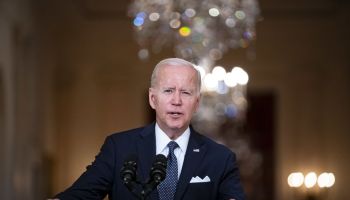A bald man with a gray beard and tired eyes is sitting in his oversize Washington office, talking about the economy. He doesn’t have a commanding presence. He isn’t a mesmerizing speaker. He has none of the look-at-me swagger or listen-to-me charisma so common among men with oversize Washington offices. His arguments aren’t partisan or ideological; they’re methodical, grounded in data and the latest academic literature. When he doesn’t know something, he doesn’t bluster or bluff. He’s professorial, which makes sense, because he spent most of his career as a professor.
He is not, in other words, a typical Beltway power broker. He’s shy. He doesn’t do the D.C. dinner-party circuit; he prefers to eat at home with his wife, who still makes him do the dishes and take out the trash. Then they do crosswords or read. Because Ben Bernanke is a nerd.
He just happens to be the most powerful nerd on the planet.
Bernanke is the 56-year-old chairman of the Federal Reserve, the central bank of the U.S., the most important and least understood force shaping the American — and global — economy. Those green bills featuring dead Presidents are labeled federal reserve note for a reason: the Fed controls the money supply. It is an independent government agency that conducts monetary policy, which means it sets short-term interest rates — which means it has immense influence over inflation, unemployment, the strength of the dollar and the strength of your wallet. And ever since global credit markets began imploding, its mild-mannered chairman has dramatically expanded those powers and reinvented the Fed.
Professor Bernanke of Princeton was a leading scholar of the Great Depression. He knew how the passive Fed of the 1930s helped create the calamity — through its stubborn refusal to expand the money supply and its tragic lack of imagination and experimentation. Chairman Bernanke of Washington was determined not to be the Fed chairman who presided over Depression 2.0. So when turbulence in U.S. housing markets metastasized into the worst global financial crisis in more than 75 years, he conjured up trillions of new dollars and blasted them into the economy; engineered massive public rescues of failing private companies; ratcheted down interest rates to zero; lent to mutual funds, hedge funds, foreign banks, investment banks, manufacturers, insurers and other borrowers who had never dreamed of receiving Fed cash; jump-started stalled credit markets in everything from car loans to corporate paper; revolutionized housing finance with a breathtaking shopping spree for mortgage bonds; blew up the Fed’s balance sheet to three times its previous size; and generally transformed the staid arena of central banking into a stage for desperate improvisation. He didn’t just reshape U.S. monetary policy; he led an effort to save the world economy.
No wonder his eyes look tired.
The last Fed chair, Alan Greenspan, inspired an odd cult of personality. Bernanke hoped to return the Fed to dull obscurity. But his aggressive steps to avert doomsday — and his unusually close partnerships with Bush and Obama Treasury Secretaries Henry Paulson and Timothy Geithner — have exposed him and his institution to criticism from all directions. He’s Bailout Ben, the patron saint of Wall Street greedheads, or King Ben, the unelected czar of a fourth branch of government. He’s soft on inflation, bombarding the country with easy money, or soft on unemployment, ignoring Main Street’s cries for even more aggressive action. Bleeding-heart liberals and tea-party reactionaries alike are trying to block his appointment for a second four-year term. Libertarian Congressman Ron Paul is peddling a best seller titled End the Fed. And Congress is considering bills that could strip the Fed of some of its power and independence.
Read full story.
Article courtesy of: Time Magazine
















